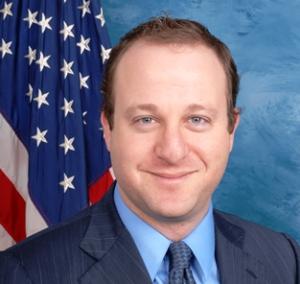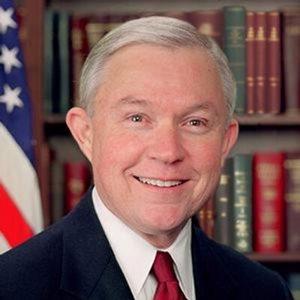Vice President Leni Robredo of the Republic of the Philippines recorded a dramatic video for our side event this month at the UN Commission on Narcotic Drugs meeting: "Human Rights Challenge: Responding to Extrajudicial Killings in the Drug War." The video has sparked a raging political firestorm in the Philippines about whether she should have made the video, and we need your help to steer the discussion back to the drug war.
A three-bill package aimed at creating a federal "path to marijuana reform" was filed today.
Another type of prescription drug is implicated in thousands of opioid ODs each year. Doctors, patients -- and non-medical users -- need to be made aware of the risks.
Millions of Americans -- and not only veterans -- suffer from PTSD. The good news is that access is on the increase.
Will the Trump administration try to roll back legal marijuana? Probably not, but it could cause some headaches.
Somebody needs to send the attorney general back to school.
A new study suggests that medical marijuana can reduce opioid abuse, Arkansas and Florida continue to grapple with addressing voter-approved medical marijuana laws, and more.
A leading doctors' group comes out for a progressive approach to opioid addiction, new research suggests medical marijuana can reduce opioid-related emergencies and overdoses, the Tennessee legislature slaps down pot decriminalization in Memphis and Nashville, and more.
South Dakota activists hope the third time's the charm when it comes to medical marijuana initiatives, a Georgia CBD expansion bill advances, the Oklahoma Supreme Court slaps down former Attorney General (now EPA head) Scott Pruitt over medical marijuana ballot language, and more.
The Congressional Cannabis Caucus is getting down to business, yet another poll shows strong (and increasing) support for marijuana legalization, Trump names an acting drug czar, a California safe injection site bill is moving, and more.
On Thursday March 16th our international drug policy work took a new turn, when we presented "Human Rights Challenge: Responding to Extrajudicial Killings in the Drug War," a side event at the UN Commission on Narcotic Drugs meeting in Vienna. The event addressed the situation in the Philippines, in which the new president of the country, former Davao Mayor Rodrigo Duterte, entered office last summer promising to slaughter large numbers of purported drug suspects. More than 7,000 people have been killed in the Philippines at the time of this writing, by police or vigilantes.

Speakers Chito Gascon, Alison Smith and Marco Perduca (photo by Joey Tranchina)
Our session unexpectedly drew high-level political interest, and Vice President Leni Robredo of the Philippines, opposition leader and a critic of the killings, recorded a
video to be presented there. The video and event were covered by TIME as part of being made public (
one article featuring the video
then another interviewing Robredo), and the news wire services
Reuters and
Agence France Press published articles, as did numerous outlets in the Philippines. At the time of this writing the video has garnered over 167,000 views.
Other speakers at the event included the Chairperson of the Commission on Human Rights of the Philippines, Chito Gascon; former prime minister of Thailand Abhisit Vejjajiva (also by video), the Chair of our partner group the Council of Asian Liberals & Democrats; and experts on international criminal justice.
Unfortunately, allies of Pres. Duterte as well as other rivals of Vice President Robredo seized on the video to attack her politically, claiming that the video constituted a "betrayal of the public trust" that she should be impeached for. Political figures including the Speaker of the Philippine House of Representatives and the president's spokesperson claimed falsely the video's release was timed to coincide with the filing by a member of Congress of an impeachment complaint against the president.
On the same day as the session, the European Parliament passed a resolution calling for an end to the killings and for the release of Sen. Leila de Lima, another prominent critic of the killings who has been jailed on charges that are widely viewed as unsupported. The critics of the vice president, which include Ferdinand Marcos Jr., son of the late dictator who lost by a narrow margin to Robredo in the vice-presidential election and is challenging it in court, have charged that Robredo was behind all three events and is engaged in a "destabilization campaign" against the Duterte government to make herself president.
By the time the actual session took place, it was already controversial, and the heated political conflict the video prompted has raged in the Philippine media during weeks since then, only now possibly slowing down. A Google News search on "Robredo" turns up dozens of articles about it, most of them mentioning the video and our UN event. We've been able to play a helpful role at times -- the Philippine Daily Inquirer published an article this week which primarily featured an interview with our executive director (Group Say Duterte, Not Robredo, Upsetting Int'l Community), shared over 7,600 times according to the newspaper's web site, and several outlets including CNN Philippines published a statement we issued clarifying that the video's release was not related to the impeachment complaint against the president.
We have full footage from the event prepared, which we are shopping around to major media outlets before posting, but which we hope to make public by next week. We hope that seeing footage from the actual event will help to turn the discussion in the Philippines back to what's important: the extrajudicial killings and other abuses in the president's drug war, and the failure of the drug in the Philippines, US and elsewhere.
In the meanwhile, you can help by circulating the vice president's powerful video message on your networks. If you have a web site, you can post an embedded copy of the YouTube video, or you can post it to your social media pages. (When posting to Facebook, we recommend you use this Facebook copy, as we've heard that Facebook deprioritizes YouTube videos.)
Here is the event flyer:
And here is Vice President Robredo's video.
back to top
This article was published in collaboration with AlterNet and first appeared here.
The Congressional Cannabis Caucus flexed its muscles Thursday as members of Congress filed a package of bills aimed at creating a "path to marijuana reform" at the federal level and protecting and preserving marijuana laws in states where it is legal.
Two Oregon politicians, Sen. Ron Wyden (D) and Rep. Earl Blumenauer (D) led the charge, announcing a bipartisan package of three bills, including a marijuana legalization bill reintroduced by Rep. Jared Polis (D-CO), as well as a pair of bills aimed at cleaning up "collateral issues" such as taxes, regulation, banking, asset forfeiture, descheduling, research, and protection for individuals.
"The federal government must respect the decision Oregonians made at the polls and allow law-abiding marijuana businesses to go to the bank just like any other legal business," Wyden said in a statement. "This three-step approach will spur job growth and boost our economy all while ensuring the industry is being held to a fair standard."
The three bills in the package have not yet been assigned bill numbers, but are:
The Marijuana Revenue and Regulation Act (Regulate Marijuana Like Alcohol Act) -- Remove marijuana from the Controlled Substances Act; impose an excise tax regime on marijuana products; allow for the permitting for marijuana businesses; and regulate marijuana in a manner similar to alcohol.
The Small Business Tax Equity Act -- Create an exception to Internal Revenue Code section 280E that would allow businesses compliant with state laws to claim deductions and credits associated with the sale of marijuana. Currently, under 280E, people and businesses cannot claim deductions or credits for the sale of Schedule I or Schedule II substances. Sen. Rand Paul, R-Kentucky, is a cosponsor of Wyden's Senate bill and Rep. Carlos Curbelo, R-Florida, is sponsoring companion legislation in the House.
Responsibly Addressing the Marijuana Policy Gap Act -- Remove federal penalties and civil asset forfeiture for individuals and businesses complying with state law; ensure access to banking, bankruptcy protection, research and advertising; expunge the criminal records for certain marijuana-related offenses; end requirement for residents of marijuana-legal states to take a marijuana drug test for positions in the federal civil service; and ease barriers for medical marijuana research.

Congressional Cannabis Caucus member Rep. Earl Blumenauer (D-OR) (wikimedia)
The three-bill package is just the latest pot law reform effort in Congress this year. At least
five other bills have already been filed, and lawmakers are also planning to reintroduce the Rohrabacher-Blumenauer amendment, which blocked the Justice Department from funding enforcement efforts against state-legal medical marijuana programs, and the McClintock-Polis amendment, which would similarly block enforcement against state-legal adult use programs. That later amendment came up just eight votes short last year.
The moves come against a backdrop of increasing acceptance of marijuana and marijuana legalization. Twenty-nine states now allow marijuana for qualified patients and eight states and the District of Columbia have legalized adult use. Public opinion polls now consistently show pot legalization with majority support; the latest came this week when the General Social Survey pegged support for legalization at 57% in 2016, up five points from just two years earlier.
Groups supporting marijuana legalization pronounced themselves pleased.
"The first time introduction of this particular piece of legislation in the US Senate is another sign that the growing public support for ending our failed war on cannabis consumers nationwide is continuing to translate into political support amongst federal officials," said NORML Executive Director Erik Altieri, "With marijuana legalization being supported by 60% of all Americans while Congress' approval rating is in the low teens, ending our country's disastrous prohibition against marijuana would not just be good policy, but good politics."

Congressional Cannabis Caucus member Rep. Jared Polis (D-CO)
"This is commonsense legislation that will eliminate the growing tension between federal and state marijuana laws," Robert Capecchi, director of federal policies for the Marijuana Policy Project, said in a statement. "Voters and legislatures are rolling back antiquated state marijuana prohibition policies, and it's time for Congress to step up at the federal level. States are adopting laws designed to improve public safety by replacing the illegal marijuana market with a tightly regulated system of production and sales. The federal government should be working to facilitate that transition, not hinder it."
"If we are truly going to move our nation towards sensible marijuana policies, the removal of marijuana from the Controlled Substances Act is paramount. Annually, 600,000 Americans are arrested for nothing more than the possession of small amounts of marijuana and now is the time for Congress to once and for all end put an end to the national embarrassment that is cannabis prohibition," said Justin Strekal, NORML Political Director. "Passing this legislation would end the current conflict between state and federal laws and allow the states to implement more sensible and humane marijuana policies, free from the threat of federal incursion."
Not everybody was happy. Former White House drug policy advisor Kevin Sabet, who now heads the anti-legalization Smart Approaches to Marijuana, told The Cannabist that more marijuana legalization would have negative consequences.
"While we don't want to see folks locked up or given criminal records for smoking pot, we support federal laws against marijuana," Sabet wrote in an e-mail. "We need to end, not expand the special interest big marijuana lobby. We can't ignore the fact that today's legalized marijuana -- and the accompanying industry -- is damaging to public health. States that have legalized marijuana continue to see a black market for the drug, increased rates of youth drug use, continued high rates of alcohol sales and interstate trafficking."
But Sabet's is an increasingly lonely voice in the wilderness.
back to top
The United States is in the grips of the worst drug overdose crisis ever, with prescription opioids and illicit opiates like heroin killing tens of thousands of people each year, but many of those people aren't dying from opioids alone. Another class of prescription drugs is too often involved.
Those drugs are the benzodiazepines -- with brand names like Valium and Xanax -- and are prescribed by the millions to treat anxiety, They can be deadly on their own, with
federal data showing nearly 9,000 fatal benzo ODs in 2015. But here's the kicker: Nearly half of all fatal benzo ODs involve both them and opioids.
And a new study published in the British Medical Journal provides further evidence of the risks of doing benzos and opioids together. That study drew on a sample of more than 300,000 patients continuously enrolled in private health insurance plans between 2001 and 2013, and researchers looked at emergency room visits for drug overdoses among those prescribed only opioids versus those prescribed both opioids and benzos.
The results were dramatic: People prescribed both types of drugs had nearly double the risk of an ER or inpatient visit for a drug overdose. Based on the results, researchers estimated that cutting benzo prescriptions for opioid users reduced the risk of ER visits by 15%. If that figure holds true for overdose deaths, some 2,630 opioid-related overdose deaths could have been prevented in 2015 alone.
The policy implications are clear, said study coauthor and Stanford University drug policy expert Keith Humphreys: Don't prescribe benzos to people being prescribed opioids.
"Even if we didn't change opioid prescribing at all, the data here suggest that we could cut overdoses dramatically just by getting prescribers to not put people on a benzodiazepine at the same time," Humphreys said.
That would require a real shift in prescribing practices. The number of patients in the study being prescribed both benzos and opioids nearly doubled between 2001 and 2013, from 9% to 17%.
Reducing co-prescriptions could be problematic for some patients. If they are suffering both pain and anxiety, they and their doctors will have to work together to decide which issue is most serious and which could be treated with alternatives. But making such tough choices could lead to a reduced risk of fatal overdose.
The BMJ study has its limits. It looked only at legally prescribed benzos and opioids, missing the effects of concurrent use of illicit drugs, and it looked only at ER and inpatient visits, not fatal overdoses. And it only demonstrated correlation, not causation. It's possible some factor other than co-prescribing was driving up overdose rates among study patients, but given that the overdose risks of mixing benzos and opioids are well established, suggesting that co-prescribing them results in increased overdoses is not exactly controversial.
Doctors can do their part to reduce the number of overdose deaths by reducing benzo and opioid co-prescribing, but since much benzo and opioid use occurs outside legal medical channels, users in non-medically supervised settings are also going to have to be keenly aware of the dangers of mixing those drugs. If they are, the evidence suggests they can save some lives.
back to top
Post-Traumatic Stress Disorder (PTSD) is not rare. According to the Department of Veterans Affairs, about eight million adults suffer from it in any given year, including tens of thousands of Afghanistan and Iraq veterans. Somewhere between 11% and 20% of those vets will suffer from it each year.
PTSD isn't limited to vets, though -- trauma comes in many forms -- and 7% to 8% of the population will suffer from it at some point in their lives. That figure rises to 10% for women.
Treating PTSD can be tricky, but numerous anecdotal reports and testimonies suggest medical marijuana can be of help. Even the stodgy VA, which tends to see marijuana use among PTSD patients as "cannabis use disorder," and notes that there have been no randomized, controlled clinical trials on the efficacy of marijuana in treating PTSD, concedes that some studies have shown positive results.
The good news for PTSD sufferers is that there are an awful lot of places in the country that have medical marijuana laws authorizing its use for PTSD. More than two dozen states, US territories, and the nation's capital allow its use, and acceptance seems to be accelerating, with seven states -- Arkansas, Florida, North Dakota, Ohio, Illinois, New Jersey and Rhode Island -- joining the list in the past year.
Colorado could be next. Legislation to PTSD to the state's list of qualifying conditions has passed the state Senate and is moving through the House. It could be on the governor's desk by the time you read these words.
Colorado is a marijuana legal state already, so PTSD patients don't have to wait for the law to change there to be able to obtain it. But making PTSD a qualifying condition would mean that patients would then be eligible for an exemption from the state's 10% tax on recreational marijuana, paying only state and local sales taxes.
Here are the 23 states, two territories, and one city that either list PTSD as a qualifying condition for medical marijuana or otherwise allow its use:
- Arizona
- Arkansas
- California
- Connecticut
- Delaware
- Florida
- Guam
- Hawaii
- Illinois
- Maine
- Maryland
- Massachusetts
- Michigan
- Minnesota
- Montana
- Nevada
- New Jersey
- New Mexico
- North Dakota
- Ohio
- Oregon
- Pennsylvania
- Puerto Rico
- Rhode Island
- Washington
- Washington, DC
back to top
This article was produced in collaboration with AlterNet and first appeared here.
Barrels of ink have been spilled over the prospect that the Trump administration could attempt to turn back the clock when it comes to legal marijuana, but for all the wailing and gnashing of teeth out there, marijuana industry insiders, advocates, and activists don't seem all that worried.

Jeff Sessions loathes marijuana, but is going after it the best use of DOJ resources? (senate.gov)
"I don't think there's any more reason to be scared than to be hopeful at this point," said Mason Tvert, Denver-based communications director for the Marijuana Policy Project. "The administration has not changed its marijuana policy, and there is reason to believe it may maintain the existing policy or adopt a similar one that respects states' laws regulating marijuana."
"Marijuana is one of the least of my concerns with the Trump administration," said Dale Gieringer, coauthor of the pioneering 1996 Prop 215 medical marijuana initiative and long-time head of California NORML. "That's the first time I've been able to say that, but I just don’t see where there's any percentage in them going after marijuana. The polls are on our side, and they can't enforce the law."
The industry, too, seems to think that there's not really that much to fear from the Trump administration.
"We are in a posture of cautious optimism," said Taylor West, communications director for the National Cannabis Industry Association (NCIA). "We're definitely not taking anything for granted -- it's quite clear that Sessions has really strong personal opposition to the industry -- but we are encouraged by the intense pushback, not just from the industry, but from elected officials, regulators, and lawmakers from both sides of the aisle. That is probably the most powerful signal to the Justice Department that dramatic changes to current policy would cause them a lot of problems."
West pointed to the strong reaction from state officials in marijuana-legal and medical marijuana states, as well as support from federal lawmakers and not just Democrats. She cited Nevada US Sen. Dean Heller as an example of a Republican lawmaker siding with the industry over the administration.
"They are speaking up because the industry and individual businesses and consumers have spoken up as their constituents and taught them about the industry and what we stand far and why we deserve respect from the federal government," she said.
And the marijuana money people appear largely unperturbed, too. In a report released Thursday, Arcview Market Research projected that the industry is going to continue to boom regardless of what happens in Washington, with revenues of nearly $7 billion this year and an astounding projected annual growth rate of 27% through 2021.
"While the uncertainty created by the mixed signals coming out of the administration may cause a temporary dip in some valuations of cannabis companies and some more risk-averse institutional investors and multinational companies may continue to stay on the sidelines, it won't impact the growth of the market much at all," said Troy Dayton, CEO of Arcview Market Research. "No matter what the administration does, states will continue to issue cannabis licenses to a long line of applicants and licensed cannabis outlets will continue to have long lines of consumers ready to purchase this product from regulated establishments."
Maintaining the Status Quo

Legal marijuana could be a $7 billion industry by 2021. (Creative Commons/Wikimedia)
Medical marijuana is now legal in more than half the states and adult recreational use is legal in eight, including the entire West Coast. Some early enforcement actions notwithstanding, the Obama administration largely turned a blind eye to state-legal but federally-illegal marijuana. The Obama Justice Department adhered to the
Cole memorandum, a 2013 "guidance" to federal prosecutors that essentially limited them to going only after legal marijuana operations that crossed specified lines: selling to minors, diverting product to non-legal states, being involved in violence or other trafficking, and the like.
Medical marijuana states at least are also protected by the Rohrabacher-Farr amendment, which bars the Justice Department from using federal funds to go after state-compliant medical marijuana operations. A similar measure, the McClintock-Hollis amendment, would have extended that same shield to the adult-legal states, but came up just short in the last Congress. Both amendments will be offered again this year.
"Jeff Sessions doesn't like marijuana -- that much is clear -- but that's not the question," MPP's Tvert argued. "The question is whether he believes limited federal resources should be used to interfere in state marijuana laws. As of right now, there's no reason to believe that's the case."
Tvert pointed to Sessions' seeming acceptance of the Cole memo, as well as a memo Sessions sent to federal prosecutors last month telling them to go after "the worst of the worst" and violent crime.
"State licensed and regulate marijuana businesses are by no means violent or the 'worst of the worst,'" Tvert noted. "They want to go after cartels and violent criminals and focus on serious crime, so why force marijuana back into the underground market?"
"President Trump said states should be able to determine own marijuana policies, and he also had strong support for legal access to medical marijuana, and we haven't heard anything new from him on it," said Tvert. "But again, it's not a question of the president's personal views, but of what the federal laws are and the realities of enforcement. Sessions has said on multiple occasions that the federal government cannot effectively enforce federal prohibition in states where it is legal."
The view was not quite as sanguine from Washington, DC, where national NORML has its offices.
"As far as the industry goes, even the threat of a crackdown by the Justice Department has a chilling effect," said Justin Strekal, NORML political director and lobbyist. "While medical marijuana is protected under Farr-Rohrabacher, the adult use economy has no such protections -- at least for now."
"The Cole memo is just a piece of paper," Strekal said, "and there is nothing stopping Sessions from just throwing it away, as the Heritage Foundation has called for him to do. But the Justice Department has no way to force states to recriminalize marijuana in decrim or legal states. The worst case would be that the adult use states are rolled back to a situation where there is no way to have a legal distribution system, but local law enforcement is not going to be enforcing federal marijuana prohibition."
Where apprehension about the direction of Trump administration pot policy is having a real impact right now is in causing politicians to think twice about legalization in states that are considering it, Strekal said.
"We're hearing feedback from legislators in Connecticut and Maryland saying that the attorney general's comments are acting as a road block, while in Georgia, we just saw a defelonization bill defeated. The mere presence of a Reefer Madness-era Jeff Sessions is frightening off potential supporters of ending prohibition."
Still, Bad Things Could Happen

If Congress blocks funding, DEA can't go after legal marijuana (sort of). (justice.gov/dea)
While an oppositional Trump administration may retard the expansion of legal marijuana in the states, the status quo of a fifth of the country living under legalization and more than half with access to medical marijuana appears unlikely to be rolled-back. But that doesn't necessarily mean a free ride for legal weed.
"There could be some sort of federal action against some adult use facility or grower or cultivation company whose product is found to have gone across state lines in quantity, or something like that," CANORML's Gieringer offered. "Like if you have a situation where Nebraska complains, maybe that could stir up pressure in the Justice Department. But that's the most I expect. I could be wrong, though."
"Since Colorado started its licensing program, there's always been a fear that the Justice Department would just bring a lawsuit saying the state is participating in an ongoing conspiracy to distribute a Schedule I drug," Gieringer observed. "They had their chance and they didn't do it. If they tried it now, they will have taken away hundreds of millions of dollars from Colorado and potentially billions from other states and leave anarchy. They can't enforce the marijuana laws anyway; it's a drain on federal resources to even try."
"A federal injection is a potential threat, but it was a potential threat six months ago, too," said MPP's Tvert. "It's still a question of resources. If that were to happen, marijuana would continue to be legal, but the federal government would be preventing states from controlling its production and sale. That would be a real serious problem."
But Tvert warned that the heavy hand of the federal government could still reach out and slap someone down.
"Sean Spicer said they would have greater enforcement, and that could mean anything," he said. "They could be planning to more rigorously enforce the laws against people not in compliance with state laws, there could be more enforcement against illegal actors, they could push states to strengthen their regulations to prevent interstate trafficking. They perhaps could encourage states to increase funding to law enforcement to investigate illegal activity. There is plenty they could do without interfering with the legal market."
The Fightback Against Rollback Will Only Grow Stronger
The advent of a potential hostile Trump administration isn't changing the way NORML does business, Strekal said.
"We're continuing to do what we've always done and act as a grassroots consumer advocacy group," he explained. "We have 150 chapters and we're engaging as an advocacy group at every level of government from city councils to state legislatures to the federal government. At the federal level, we're very encouraged by the formation of the congressional cannabis caucus. We've been working with them to host a few events."
"This moment in time, where there is a lot of uncertainty at the federal level, is the kind of moment the NCIA was created for," said West. "We've been building relationships and allies in DC around industry issues, so when we need those allies, we have them."
Like MPP, the NCIA has a full-time staff lobbyist in Washington. It also works with another DC-based lobbying firm to work the Hill, and with legislators and elected officials.
"You've been able to see, through our work and the work of others, a very strong pushback from people who previously wouldn't have been in favor of the marijuana industry," West said. "The federal government can try to enforce marijuana prohibition in states where it is legal, but it doesn't really have the personnel to do that without the full cooperation of state and local law enforcement. If states are resisting that crackdown, which elected officials have said they would do, it becomes very difficult, if not impossible."
Legal marijuana is on guard, but it's not running away from a fight. The question for the Trump administration becomes whether this is a fight worth fighting.
back to top
This article was produced in collaboration with AlterNet and first appeared here.
US Attorney General Jeff Sessions once again displayed his ignorance about drugs Wednesday as he claimed that marijuana is "only slightly less awful" than heroin. In the same speech, he acknowledged rising heroin and prescription opioid overdose death levels, but failed to note that no one dies from overdosing on marijuana.

The US attorney general made more inflammatory remarks about marijuana on Wednesday. (senate.gov)
Heroin produces physical addiction and is linked to thousands of overdose drug deaths each year. Marijuana does not produce physical addiction, and although it may lead to psychological dependency for a small percentage of users, the
dependency rate is much lower than it is even for users of alcohol and tobacco, both of which are more dangerous than marijuana.
Sessions' uninformed claim is likely to increase jitters in the country's nascent legal marijuana industry as it confronts an attorney general whose rhetoric so far has strongly suggested he would like to crack down on legal weed -- although he has yet to take any concrete steps to do so.
Sessions made the claim in prepared remarks for a speech to state, local, and federal law enforcement in Richmond, Virginia. The long-time foe of marijuana and marijuana law reform again sketched his stance toward pot, saying "life-wrecking dependency" on marijuana is "only slightly less awful" than heroin addiction.
I realize this may be an unfashionable belief in a time of growing tolerance of drug use. But too many lives are at stake to worry about being fashionable. I reject the idea that America will be a better place if marijuana is sold in every corner store. And I am astonished to hear people suggest that we can solve our heroin crisis by legalizing marijuana -- so people can trade one life-wrecking dependency for another that's only slightly less awful. Our nation needs to say clearly once again that using drugs will destroy your life.
Sessions would not be so "astonished" at the notion that access to marijuana lead to declines in opioid overdose deaths if he actually followed the field. At least three recent studies have found a link: A 2014 Johns Hopkins study found that states with medical marijuana laws have a 25% lower opioid death rate than other states; a 2015 RAND study found a decline in opioid deaths of between 16% and 31% in states that had medical marijuana dispensaries; and a 2016 Health Affairs study found that doctors in medical marijuana states wrote fewer opioid prescriptions for Medicaid patients.
Actual science notwithstanding, Sessions suggested he was prepared to embark on a 21st Century version of Nancy Reagan's "Just Say No" and the "this is your brain on drugs" anti-drug propaganda campaigns of the 1980s:
In the '80s and '90s, we saw how campaigns stressing prevention brought down drug use and addiction. We can do this again. Educating people and telling them the terrible truth about drugs and addiction will result in better choices. We can reduce the use of drugs, save lives and turn back the surge in crime that inevitably follows in the wake of increased drug abuse.
But if Sessions wants to educate Americans on "the terrible truth" about drugs, he should probably start with himself. An attorney general who cannot recognize the difference between marijuana and heroin is not one who is fit to pronounce on such matters.
back to top
A new study suggests that medical marijuana can reduce opioid abuse, Arkansas and Florida continue to grapple with addressing voter-approved medical marijuana laws, and more.
NationalOn Monday a new study found that legalized medical marijuana could help curb opiod abuse. A new study reported in the journal Drug and Alcohol Dependence finds that in states with medical marijuana, hospitalization rates for opioid pain pill dependence and abuse dropped by nearly a quarter (23%), while opioid overdose rates dropped by 13%. Researchers had expected to see an increase in marijuana-related visits. "Instead, medical marijuana laws may have reduced hospitalizations related to opioid pain relievers," said study author Yuyan Shi, a public health professor at the University of California, San Diego.
Arkansas
Last Thursday the Senate passed two medical marijuana "fix" bills. The state Senate approved two bills aimed at modifying the state's voter-approved medical marijuana law. The Senate approved House Bill 1400, which would ban the smoking of marijuana anywhere tobacco smoking is banned. That bill now goes to the governor's desk. The Senate also approved Senate Bill 721, which would require dispensaries to appoint a pharmacist director who would be available for consultations with patients during hours the dispensary is open. That bill now heads to the House.
Colorado
Last Wednesday the patient plant limit rose to 24 as a bill limiting home grows advanced. A bill aimed at limiting marijuana home grows has been amended -- again -- in the House Judiciary Committee. In a Wednesday vote, the committee approved raising the plant limit under House Bill 1220 to 24 plants. The bill had originally set the number at 12, but lawmakers then upped the count to 16, and now 24 -- if patients register with the state. The bill now heads for a House floor vote.
Florida
On Tuesday a restrictive medical marijuana bill advanced. While a half-dozen competing measures aim to address the state's voter-approved medical marijuana system, the most restrictive measure advanced in the House on Tuesday. House Bill 1397 would limit growers to the seven currently permitted and bans smoking, vaping, and edibles. It moved out of the Health Quality Subcommittee on a 14-1 vote, but faces two more committee votes before heading for the House floor. None of the five Senate bills addressing medical marijuana have yet had a hearing.
Georgia
On Tuesday a CBD cannabis oil expansion bill passed the House. The House voted 167-4 Tuesday to approve Senate Bill 16, which would add six new qualifying conditions for the use of cannabis oil, including autism, AIDS, Tourette's Syndrome, and Alzheimer's. The state Senate approved the bill last month.
Maine
On Monday Ma bill to make medical marijuana users eligible for organ transplans got a hearing. Legislators heard powerful testimony from patients removed from life-saving organ transplant lists because they used marijuana as they considered Legislative Document 764. The bill would targets the Maine Medical Center, the only transplant center in the state, whose transplant policy states that "use of prescribed or recreational marijuana by any route of administration is absolutely prohibited." No vote was taken, and the bill is scheduled for more hearings next month.
Oklahoma
On Monday the state Supreme Court ruled the former attorney general wrongly changed initiative ballot question wording. Former state Attorney General Scott Pruitt (R), now head of the federal Environmental Protection Agency, changed the ballot title for a medical marijuana initiative in a way that would mislead voters. The original ballot question read: "A yes vote legalizes the licensed use, sale, and growth of marijuana in Oklahoma for medicinal purposes," but Pruitt changed that to: "This measure legalizes the licensed use, sale, and growth of marijuana in Oklahoma. There are no qualifying medical conditions identified." Now, the original language for the 2018 initiative has been restored.
West Virginia
Last Friday a medical marijuana bill advanced. The Senate Health and Human Resources Committee voted to approve Senate Bill 386, the West Virginia Medical Cannabis Act. The bill would create a system of regulated cultivation sites and dispensaries and allow the use of medical marijuana by persons suffering from a list of qualifying conditions. The bill now heads to the Senate Judiciary Committee.
[For extensive information about the medical marijuana debate, presented in a neutral format visit MedicalMarijuana.ProCon.org.]
back to top
A leading doctors' group comes out for a progressive approach to opioid addiction, new research suggests medical marijuana can reduce opioid-related emergencies and overdoses, the Tennessee legislature slaps down pot decriminalization in Memphis and Nashville, and more.

The ACP sees an opioid crisis and has some progressive approaches. (Creative Commons/Wikimedia)
Tennessee Bill to Block Municipal Decriminalization Passes Legislature. After the state's two largest cities, Memphis and Nashville, passed municipal marijuana decriminalization ordinances, the legislature has struck back. The Senate on Monday approved House Bill 173, which bars cities in the state from crafting marijuana penalties lesser than state law. The measure passed the House last week and now head's for the governor's desk.
Medical Marijuana
Legalized Marijuana Could Help Curb the Opioid Epidemic, Study Finds. A new study reported in the journal Drug and Alcohol Dependence finds that in states with medical marijuana, hospitalization rates for opioid pain pill dependence and abuse dropped by nearly a quarter (23%), while opioid overdose rates dropped by 13%. Researchers had expected to see an increase in marijuana-related visits. "Instead, medical marijuana laws may have reduced hospitalizations related to opioid pain relievers," said study author Yuyan Shi, a public health professor at the University of California, San Diego.
Maine Bill Would Make Medical Marijuana Users Eligible for Organ Transplants. Legislators heard powerful testimony from patients removed from life-saving organ transplant lists because they used marijuana as they considered Legislative Document 764 Monday. The bill would targets the Maine Medical Center, the only transplant center in the state, whose transplant policy states that "use of prescribed or recreational marijuana by any route of administration is absolutely prohibited." No vote was taken, and the bill is scheduled for more hearings next month.
Heroin and Prescription Opioids
American College of Physicians Calls for Opioid Addiction to Be Treated as Chronic Condition, Not Moral Failing. In a position paper in the Annals of Internal Medicine, the American College of Physicians released a comprehensive set of public policy recommendations for the prevention and treatment of substance use disorders that calls for treating addiction as a treatable chronic condition, not a moral failing or criminal activity. The guidelines call for expanded access to the overdose reversal drug naloxone and opioid maintenance therapies, as well as urging physicians to avoid opioids as first-line treatments for most chronic pain and to limit opioids for acute pain to the lowest possible dose for the shortest possible time. And they suggest that it is time to consider drug decriminalization or legalization: "Stakeholders should assess the risks and benefits of removing or reducing criminal penalties for nonviolent offenses involving illicit drugs."
back to top
South Dakota activists hope the third time's the charm when it comes to medical marijuana initiatives, a Georgia CBD expansion bill advances, the Oklahoma Supreme Court slaps down former Attorney General (now EPA head) Scott Pruitt over medical marijuana ballot language, and more.

Will South Dakota ever approve medical marijuana? Voters could have another chance in 2018. (Flickr)
South Dakota Marijuana Legalization, Medical Marijuana Initiatives Get Attorney General Approval. State Attorney General Marty Jackley (R) has provided required attorney general explanations for two proposed initiatives. A marijuana legalization initiative would allow the possession of up to an ounce and the cultivation of up to five plants, as well as taxed and regulated marijuana commerce, while a medical marijuana initiative would allow patients to possess up to three ounces and grow a minimum of six plants. The initiatives are now ready for signature gathering and both need 13,871 valid voter signatures to qualify for the November 2018 ballot.
Medical Marijuana
Restrictive Florida Medical Marijuana Bill Advances. While a half-dozen competing measures aim to address the state's voter-approved medical marijuana system, the most restrictive measure advanced in the House on Tuesday. House Bill 1397 would limit growers to the seven currently permitted and bans smoking, vaping, and edibles. It moved out of the Health Quality Subcommittee on a 14-1 vote, but faces two more committee votes before heading for the House floor. None of the five Senate bills addressing medical marijuana have yet had a hearing.
Georgia CBD Cannabis Oil Bill Clears House. The House voted 167-4 Tuesday to approve Senate Bill 16, which would add six new qualifying conditions for the use of cannabis oil, including autism, AIDS, Tourette's Syndrome, and Alzheimer's. The state Senate approved the bill last month.
Oklahoma Supreme Court Says Former Attorney General Wrongly Changed Initiative Ballot Question Wording. Former state Attorney General Scott Pruitt (R), now head of the federal Environmental Protection Agency, changed the ballot title for a medical marijuana initiative in a way that would mislead voters. The original ballot question read: "A yes vote legalizes the licensed use, sale, and growth of marijuana in Oklahoma for medicinal purposes," but Pruitt changed that to: "This measure legalizes the licensed use, sale, and growth of marijuana in Oklahoma. There are no qualifying medical conditions identified." Now, the original language for the 2018 initiative has been restored.
Asset Forfeiture
Iowa Senate Approves Civil Asset Forfeiture Reform. The state Senate on Tuesday approved Senate File 446, which would bar the seizure of property valued at less than $5,000 unless there was a prior criminal conviction. The measure also increases the standard of proof required for asset forfeiture from "a preponderance of the evidence" to "clear and convincing evidence." The bill is now in the House, where it must advance by a committee this week to survive.
Law Enforcement
Arizona Senator, Congresswoman File Federal Bill to Increase Penalties for Border "Spotters." US Sen. John McCain (R-AZ) and Rep. Martha McSally (R-AZ) have introduced the "Transnational Criminal Organization Illicit Spotter Prevention and Elimination Act," which would toughen penalties on "spotters" who warn drug and human smugglers about the position of Border Patrol surveillance or officers. The bill would subject such people to up to 10 years in federal prison. The bill is not yet available on the congressional web site.
back to top
The Congressional Cannabis Caucus is getting down to business, yet another poll shows strong (and increasing) support for marijuana legalization, Trump names an acting drug czar, a California safe injection site bill is moving, and more.

The DOJ's inspector general is not impressed with DEA asset forfeiture practices. (dea.gov)
New General Social Survey Poll Shows Jump in Support for Legalization. Support for marijuana legalization surged last year, according to new data released by the General Social Survey. The poll has support for legalization at 57% in 2016, up five points from 2014.
Package of Federal Marijuana Reform Bills, Including Legalization, Filed Today. The Congressional Cannabis Caucus flexed its muscles Thursday as members of Congress filed a package of bills aimed at creating a "path to marijuana reform" at the federal level and protecting and preserving marijuana laws in states where it is legal. Two Oregon politicians, Sen. Ron Wyden (D) and Rep. Earl Blumenauer (D) led the charge, announcing a bipartisan package of three bills, including a marijuana legalization bill reintroduced by Rep. Jared Polis (D-CO), as well as a pair of bills aimed at cleaning up "collateral issues" such as taxes, regulation, banking, asset forfeiture, descheduling, research, and protection for individuals. Click on the link to read our feature story and see more about the bills.
Vermont Legalization Bill Hits Snag. The effort to legalize marijuana took a detour Tuesday when the House leadership indefinitely postponed a vote on House Bill 170 after it became apparent it didn't have enough votes to pass. The bill isn't dead, but it has now been sent to the House Human Services Committee, where it will sit until the leadership thinks it has come up with enough votes to pass.
Medical Marijuana
Arkansas Senate Approves Medical Marijuana Tax Bill. The Senate voted 31-1 Wednesday to approve House Bill 1580, which would impose a 4% tax on medical marijuana at each transaction. The tax would be levied on growers' sales to dispensaries and again on dispensaries' sales to individuals. The tax would sunset in 2019 after raising an estimated $3.6 million. The bill had already passed the House, but was sent back there for a concurrence vote after amendments were added in the Senate.
Colorado Legislators Vote to Rein In Medical Marijuana Home Grows. The state Senate voted unanimously Wednesday to approve House Bill 17-1220, which would limit the number of medical marijuana plants grown at a single residence to 12. Under current law, up to 99 plants are allowed. The bill now heads to the governor's desk.
West Virginia Senate Approves Medical Marijuana Bill. The state Senate voted Wednesday night to approve Senate Bill 386, which would allow for the use of medical marijuana for specified medical conditions. The bill now heads to the House of Delegates.
Asset Forfeiture
Justice Department Report Scorches DEA Over Asset Forfeitures. The Justice Department inspector general's office has released a report on DEA cash and asset seizure practices that warns the way DEA operates may pose a risk to civil liberties. The report noted that most seizures result from direct observation by DEA agents or local police, leading to concerns about the potential for racial profiling. The report examined a hundred asset forfeiture cases, and found that fewer than half advanced ongoing investigations. "When seizure and administrative forfeitures do not ultimately advance an investigation or prosecution, law enforcement creates the appearance, and risks the reality, that it is more interested in seizing and forfeiting cash than advancing an investigation or prosecution," the report said.
Drug Policy
Trump Nominates Richard Baum as Acting Drug Czar. The president has nominated Office of National Drug Control Policy (ONDCP -- the drug czar's office) veteran and Georgetown University adjunct professor Richard Baum to be acting drug czar. While some of Baum's remarks over the years have drawn controversy, he is generally viewed by insiders as having a public policy approach as opposed to a drug warrior approach.
Harm Reduction
California Bill to Allow Supervised Injection Sites Advances. A bill that would create a five-year exemption from the state's drug laws to allow for the operation of supervised injection facilities advanced in the Assembly last week. The Assembly Health Committee voted 9-4 to approve Assembly Bill 186. The bill now goes to the Assembly Public Safety Committee.
back to top












